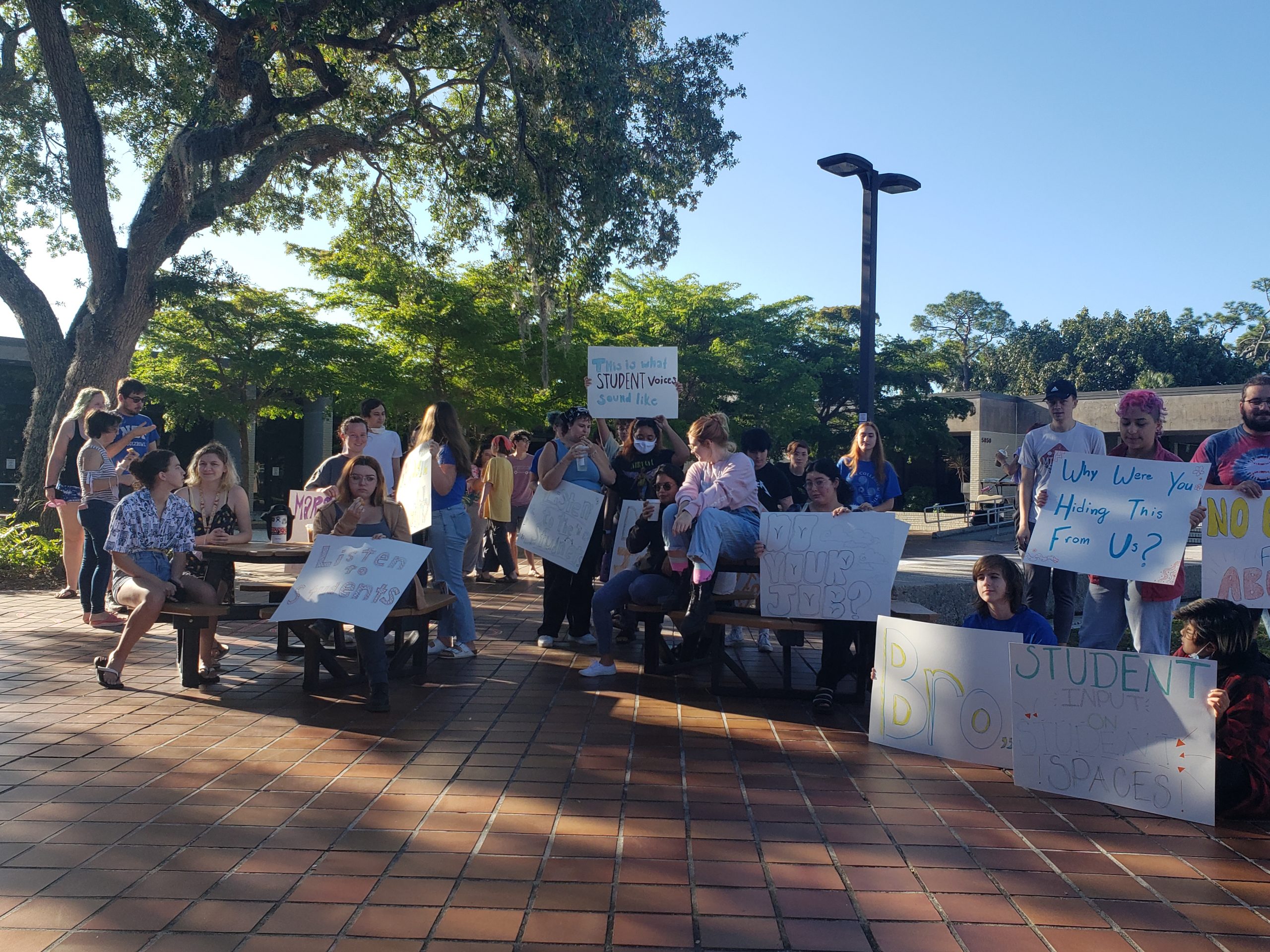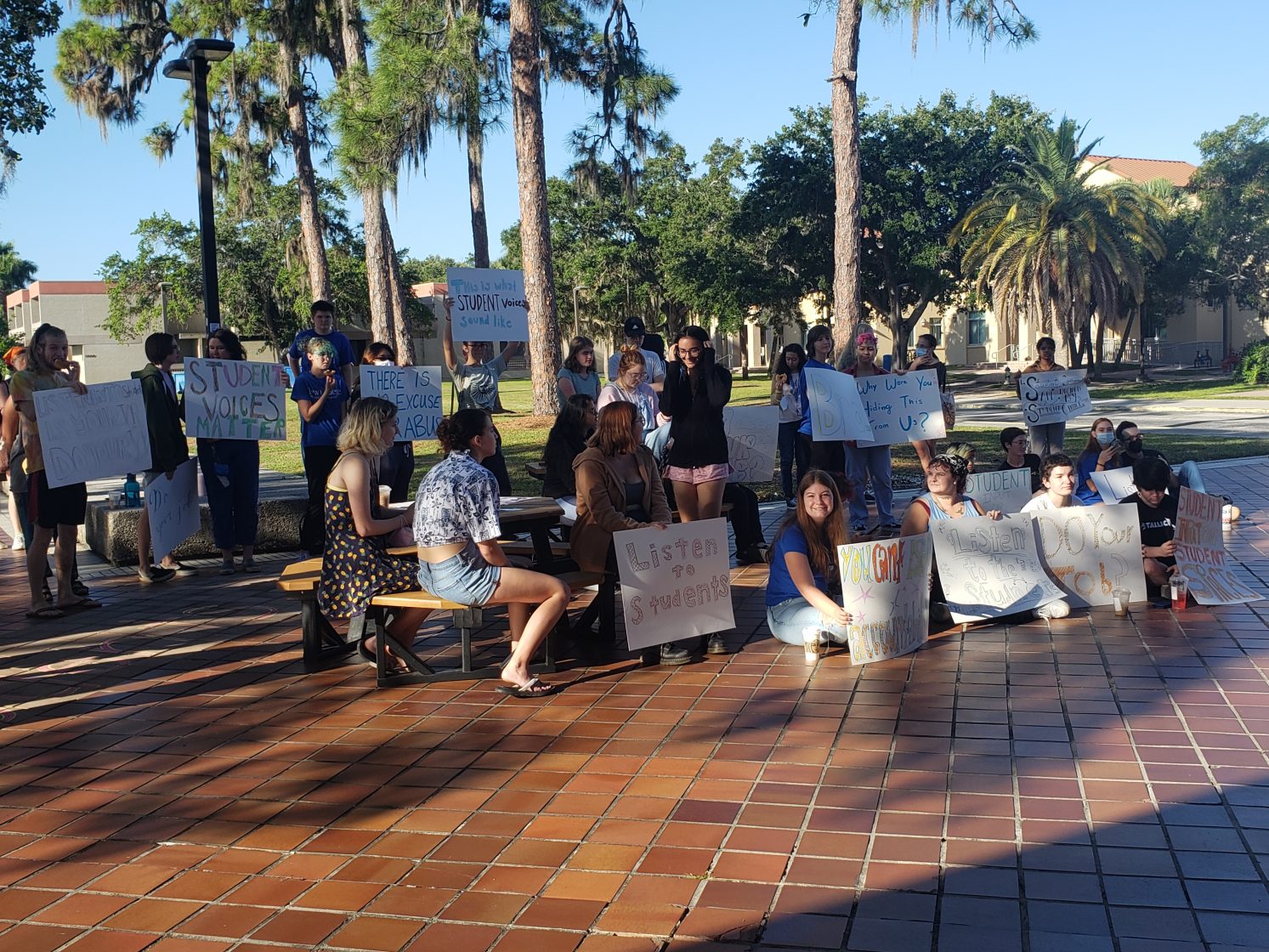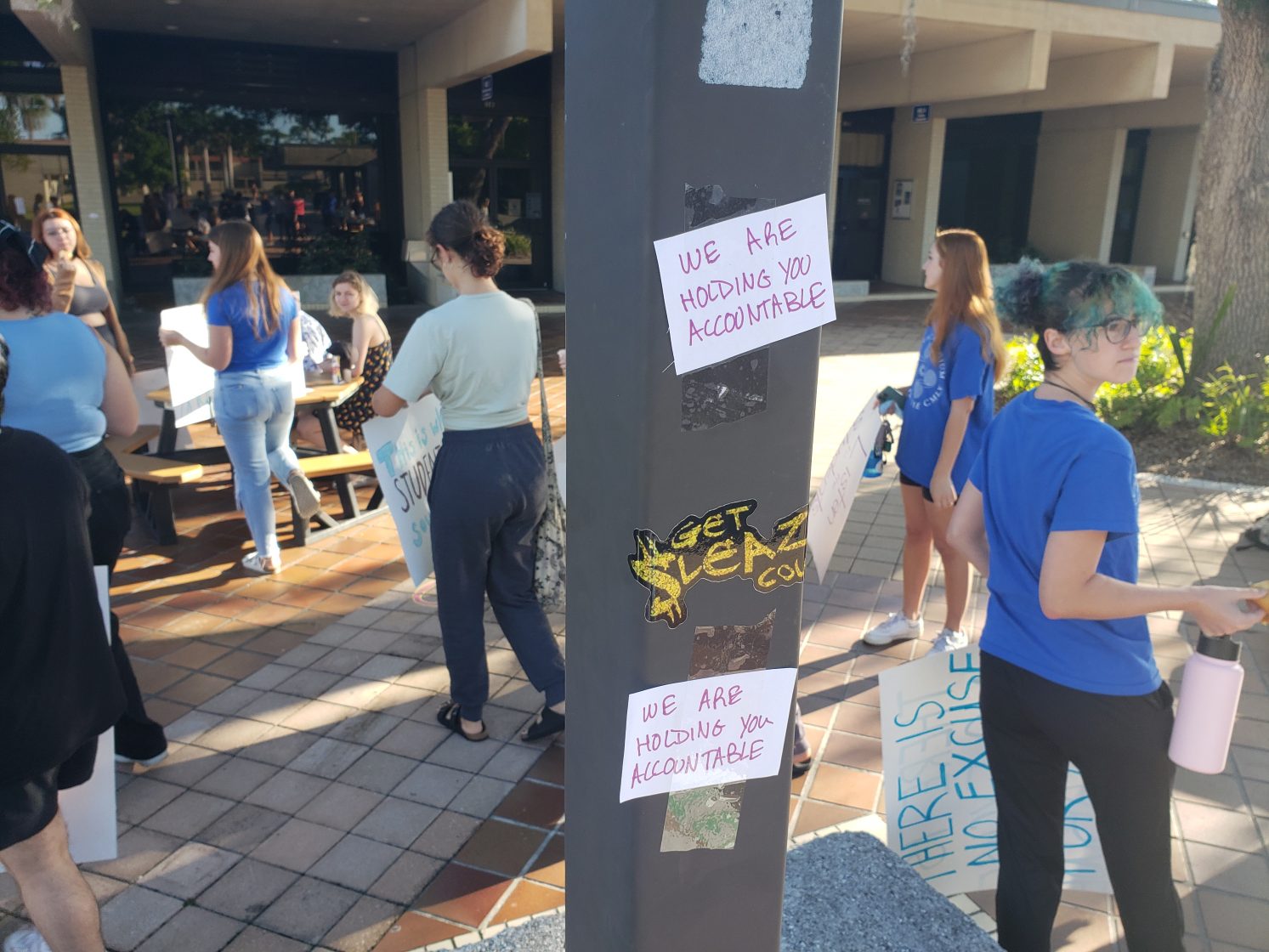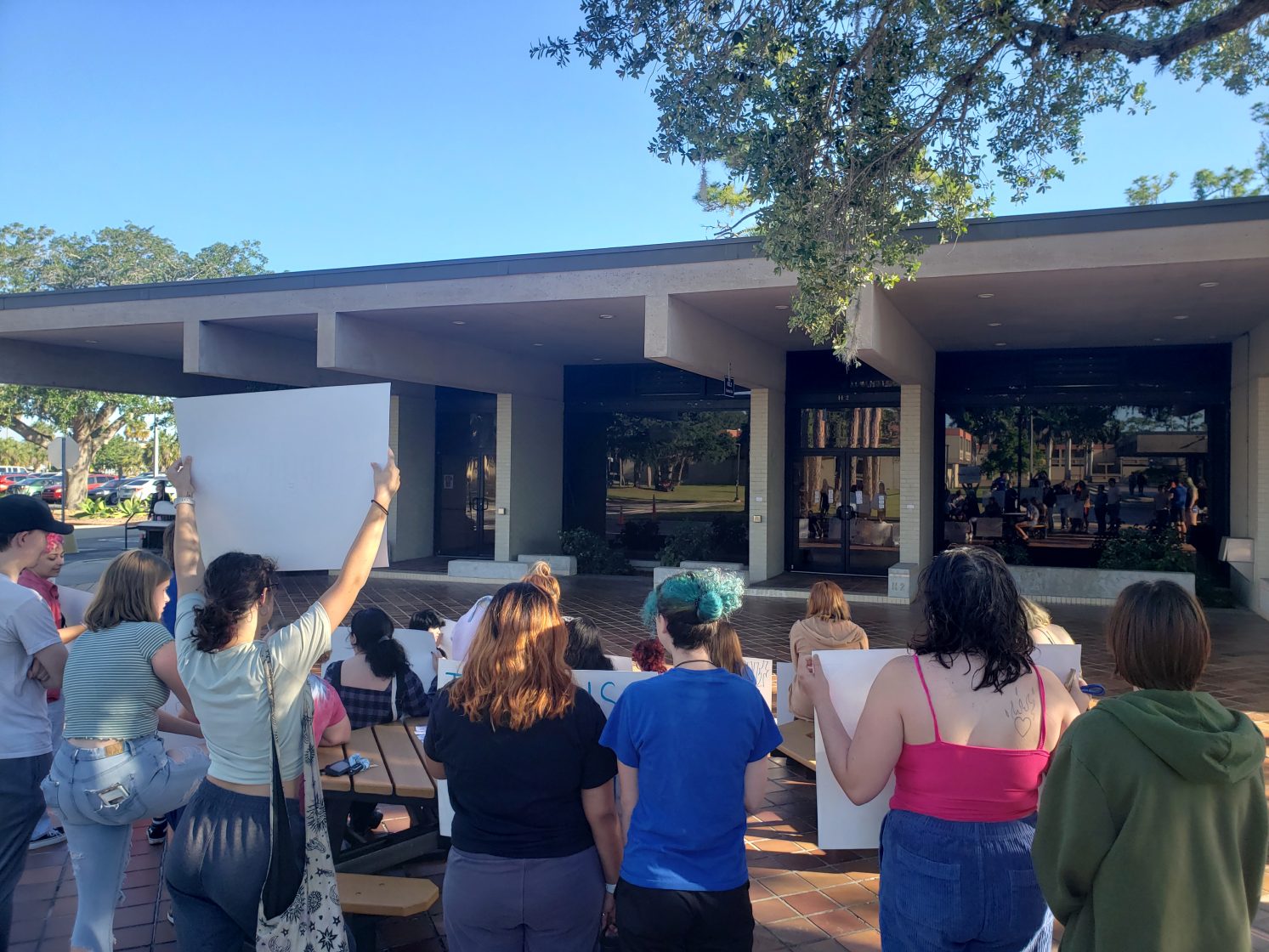An Emergency Senate Meeting was called on May 11—the final day of classes for the semester—by New College Student Alliance (NCSA) President and second-year Grace Keenan, where details of a Summer 2022 Refresh Plan orchestrated by Vice President of Student Affairs S. Marjorie Thomas were revealed to the student body for the first time. The plan, among other things, calls for the rearrangement of various student and residential spaces, including the Residential Advisor (RA) Resource Room, Equipment Teaching Assistant (EQTA) office and the Catalyst office. Despite various student leaders and representatives denying being consulted or contacted about these changes until recently, Keenan claims that Thomas told her she had planned to meet with subcontractors and sign off on these changes on May 11 and 12.
Additionally, student testimonials during the Emergency Senate Meeting included accusations of inappropriate behavior by Thomas and general complaints about a lack of communication or connection with the student body. Students expressed feeling ignored in light of Thomas’ plan and disturbed in light of these allegations, and in response, a group of 111 students passed a unanimous vote of no confidence that evening.
An outside investigation has been launched at this time. Due to this, Thomas has opted not to comment on matters regarding the Summer Refresh plan, whether or not subcontractors were in fact signed on May 11 and 12 and on the allegations of inappropriate behavior.
Recent student protests and conflicting information from the accused and accusers weaves a troubling narrative of miscommunication, and of students feeling unseen, unheard and unrecognized on campus and in their student spaces. With so much having been left unexplained, students are finally getting some answers—and they are also starting to push back.
What is Known About the Summer 2022 Refresh Plan
The following infographics were created by Thomas, detailing a Summer 2022 Refresh Plan of residence halls, Hamilton classrooms (HCLs) and Hamilton “Ham” Center, as well as a Summer 2022 Metz Refresh. These documents were provided to Keenan in an email thread—which included a Catalyst staff member—by Thomas on May 11, which was also the first time any documentation of this plan had been provided.
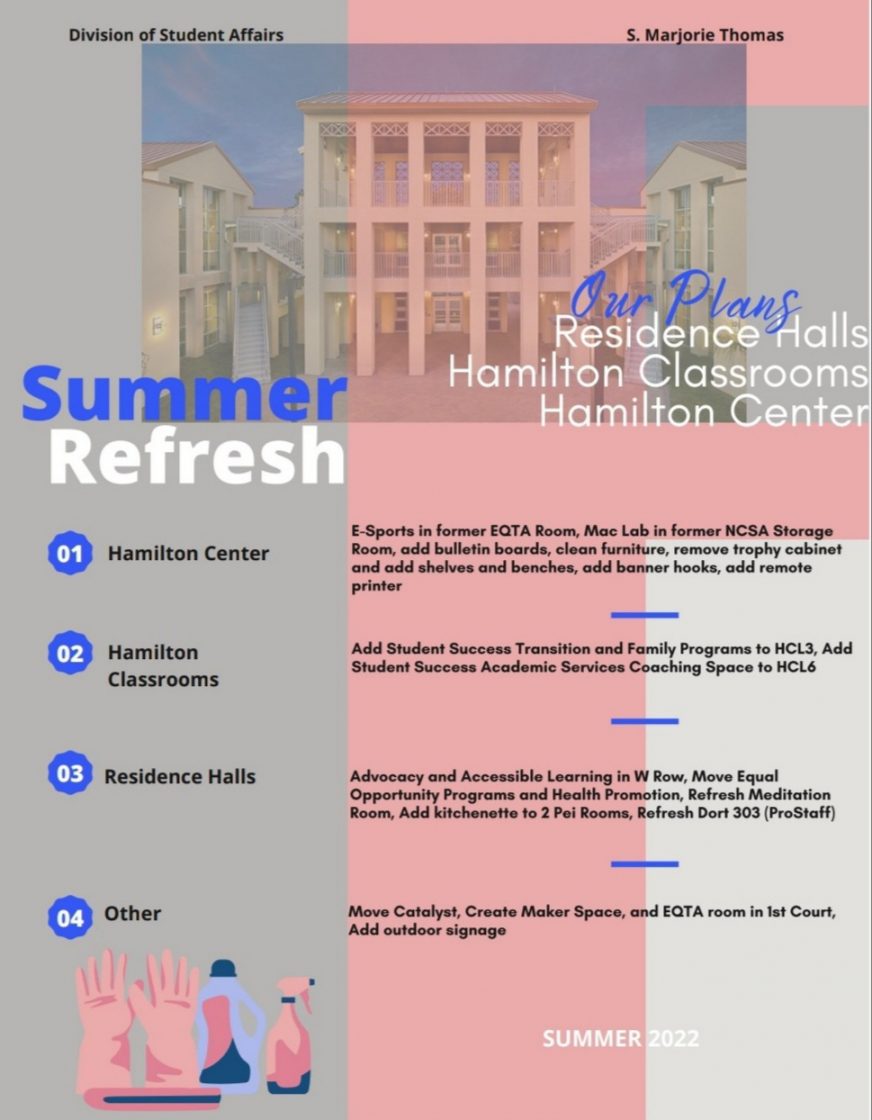
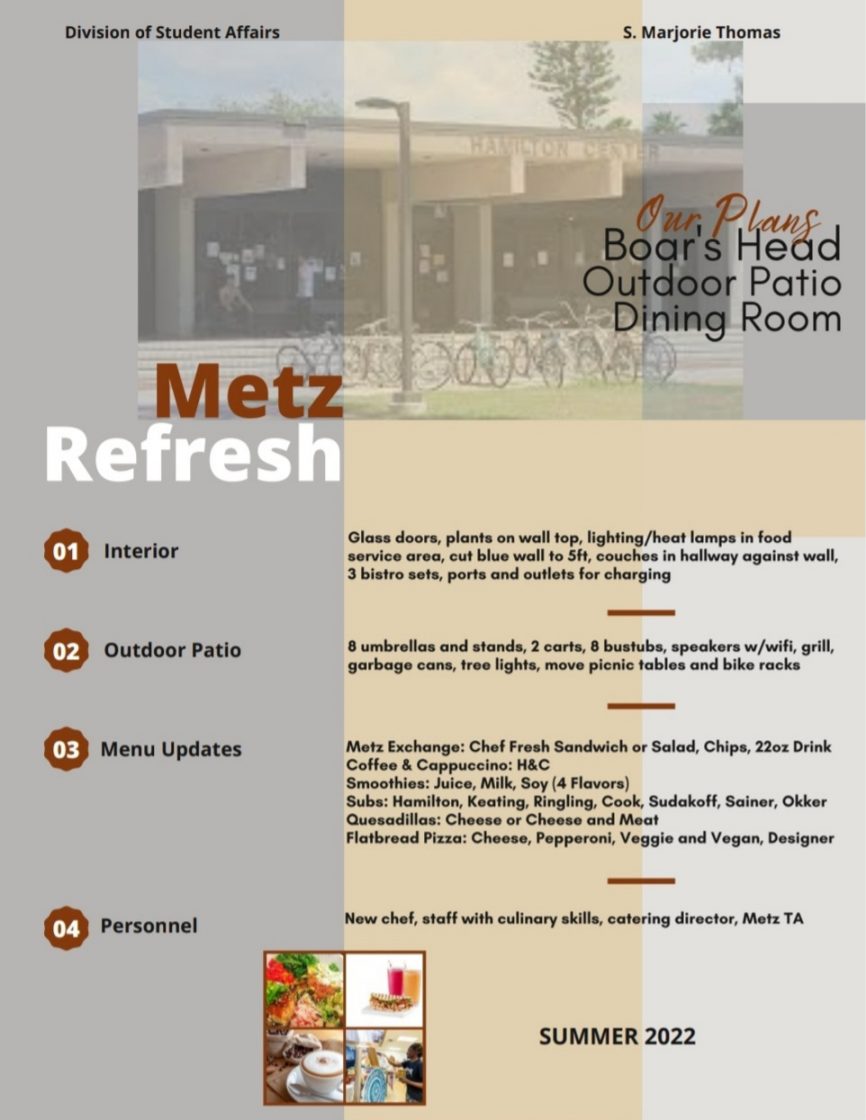
In order to better visualize the changes to residential campus being proposed, Keenan created a rough map that was displayed during the Emergency Senate Meeting.
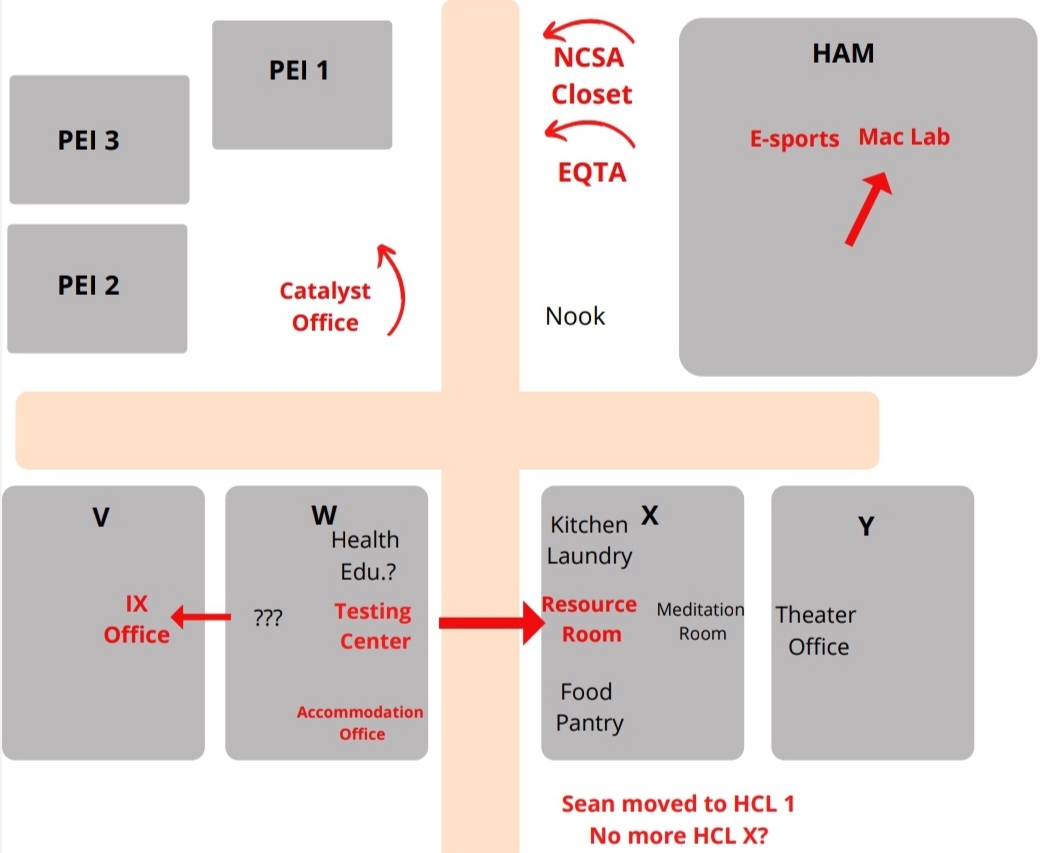
Keenan explained during the meeting that pieces of Thomas’ plan became known to her in waves; the NCSA had previously agreed to the relocation of the ETQA office and the NCSA Closet out of Ham in favor of a new E-Sports Room and the Mac Lab—currently in V Residence Hall—but she has retracted this approval in light of new information. This new information includes relocation of the RA Resource Room and the Catalyst office, which Keenan said she learned of on May 4. All remaining details were made clear to her on the day of the Emergency Senate Meeting, May 11.
According to Thomas, the primary motivation for the Summer Refresh plan is to expand the Student Success Center (SSC) and to arrange for a Testing Center and an Advocacy and Accessible Learning Center (AALC) to be next to each other. In accordance with the plan, the RA Resource Room would be moved to HCL X—currently Residence Hall Director Sean Brueggemann’s office—and the space would be transformed into a new Testing Center. The Catalyst office would be transformed into the AALC office, and the Catalyst office would be moved into a residential room in Pei’s first court, as would the ETQA office and the NCSA Closet. Furthermore, the “Equal Opportunity Programs and Health Promotion” listed in the Summer Refresh refers to the Title IX office, which would move into the V Residence Hall.
It is presently unclear what the current Title IX office would be repurposed for. It is also not known which Pei rooms the Catalyst office, the ETQA office and the NCSA Closet would be moved into, and whether or not they are renovated.
In a follow-up interview after the Emergency Senate Meeting, Keenan told the Catalyst that she had briefly quarantined in an unrenovated room in Pei’s first court in Fall 2020, and described it as overridden with mold, “absolutely unacceptable” and “unlivable.”
Keenan asked, “I know that the vents connect [in Pei buildings], so if people live there or offices are moved there, my first concern would be, is it actually safe even though it’s renovated? I know some of the rooms are in insanely bad condition. But we’ve been given no opportunity to see what these rooms might be.
“Putting students in such an isolated place is not okay,” Keenan continued. “It’s just ridiculous to practically exile them to Pei 1 and move administrative offices into such central student places. I can see there’s a benefit to having key resources in these places, but why move out our student newspaper to do that?”
Additional relocations in the HCL building include creating an SSC office and a “Family Programs” office in HCL 3—the latter of which serves an ambiguous purpose—and expanding the current SSC that resides in HCL 5 to also fill HCL 6, which currently holds the Testing Center. Keenan, who worked in the SSC Center this past year, agreed that this particular expansion is a worthwhile proposal, which is backed up by Thomas’ claims that Student Success Coaches often need to hold appointments outside or while sitting down on the floor. However, it is this expansion that seems to have triggered the displacement of the RA Resource Room.
“The SSC has been very successful, and they need more space,” Keenan acquiesced. “I was also one of the coaches who would coach outside at the picnic tables. Most of the time, it was due to preference, because I liked being outside.”
Keenan explained that the SSC recently hired Assistant Director for Student Success Sydney Sloan, who moved into an office in the SSC that was previously available for Student Success Coaches to hold appointments.
“Or we always had the option of going into HCL 7 if there was nothing going on,” Keenan continued. “And there was almost never anything going on during business hours.”
“There was an idea to take over HCL 6, and up until a week ago [a week prior May 12, the date of this interview], it was always an idea that [I thought would be] talked about during the HCL renovations,” Keenan elaborated. “I asked the SSC last week, ‘Do you need this next year? Can this wait?’ And they were like, ‘Yeah, it can wait. We can do with another year with this space or find another temporary solution.’ It’s not a necessary change, and if you don’t have to move the Testing Center, none of these other places have to move, so it doesn’t make sense.”
Indeed, this Summer Refresh plan would be one of three renovations also set to occur on campus in the near future, alongside the HCL renovations and the New College Challenge—of which Thomas is on the leadership team. However, unlike these other renovations, the Summer Refresh plan has no clear listed budget or a public leadership team of any kind. With additional renovations on the horizon, Keenan called the Summer Refresh plan “unnecessary.”
“The goal she [Thomas] said is that they need more administrative space,” Keenan said. “Whatever renovations they’re doing in HCL 3, I don’t know, and they frankly don’t seem to affect students at all. So if they need more administrative spaces in that space, they can go ahead. That is their space. But the Testing Center, Resource Room and Catalyst changing around doesn’t give them any more office space besides the AALC office. I don’t know how this [the Catalyst office] could be turned into an office for [multiple] people.”
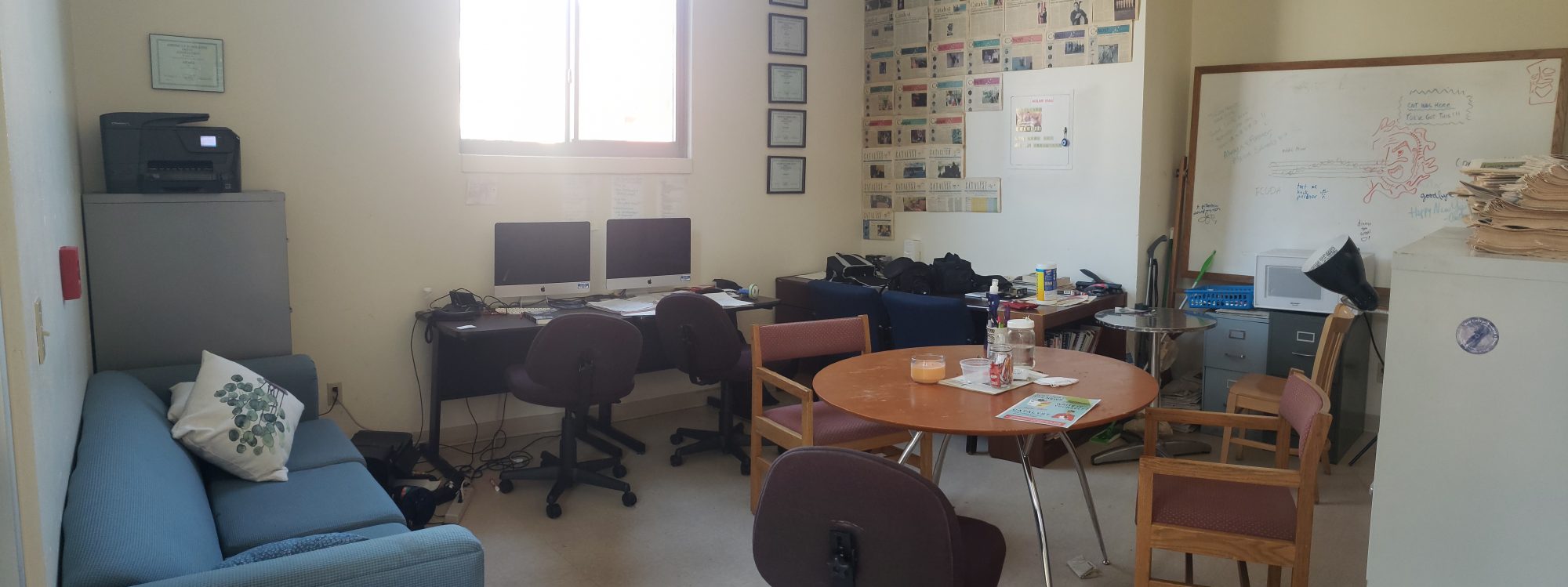
“It doesn’t make sense, and it doesn’t address student needs,” Keenan continued. “The plans don’t do what they need to do. She very convincingly says that these are effective changes, but when you look at the map, why the shuffling around? It’s not like we live on a huge campus, it’s not a huge walk. Why spend that money?”
Lack of Student Input and Consent
General Counsel David Fugett released a statement to the Catalyst when asked about the rules and regulations for relocating student spaces on the residential campus, who is able to make those relocations, with what permissions, and what written guidelines there are.
“While the College has extensive regulations addressing scheduling of events (space management), the College does not have specific guidance or regulations that address potential repurposing of assigned space,” Fugett wrote. “Any particular idea or plan for a change requires consultation with a variety of parties, including but not limited to Facilities Management, IT, Budget, Procurement, external vendors, including contractors, and not the least, current and proposed users of the space, be they program administrators, faculty or students. User feedback is extremely valuable, and is a vital, yet not determinative factor in the final decision of the College to commit resources towards campus improvements.”
During the Emergency Senate Meeting, former NCSA President and third-year Sofia Lombardi clarified that during her term, she was aware of “about 20%” of the initiatives listed in the Summer Refresh plan. The earliest Lombardi said she can recall Thomas talking about initiatives brought up in the Summer Refresh plan is “October or November” of 2021, but Lombardi explained that she never explicitly approved or disapproved of any of them.
“Occasionally I would say, ‘That sounds like maybe it would be a good idea with further student input,’” Lombardi clarified in a follow-up interview with the Catalyst. “But everything she was giving to me was just a little piece here and a little piece there every other week. The full picture was never presented to me, and I don’t approve things unless I see the whole picture. So to say that I approved that when I didn’t even know about a lot of the changes, and I was intentionally misled and confused on the changes I did know about, that’s not informed consent.”
The first time that any RAs were informed of their relocation by Thomas was during their end-of-the-year RA Banquet on May 4. Third-year RA Natalie “Nat” Kornblum gave the Catalyst further detail in an interview:
“The point of that event, it was meant to be a celebration of our work,” Kornblum said. “Marjorie was there, she kind of gave this opening statement that was about 10 to 15 minutes. She thanked us for our work, and then she went onto this quite long explanation of some changes that would be coming to campus in the fall. She was not super clear about what the changes were. She talked about them very abstractly.”
It was at this banquet that Thomas told the RAs that the Testing Center “would be moving to W Row.” Kornblum continued to say that the RAs had been contacted earlier that day by RA Representative and third-year Melody Scott, who told them that Keenan had recently learned of the possibility that the RA Resource Room would be moving to HCL X, but that none of the RAs were aware that any concrete plans were underway or why this move would happen.
“We allowed Marjorie to finish her statement, and then one of the RAs raised their hand and said, ‘If the Testing Center is moving to W Row, then where is the Resource Room going?’” Kornblum continued. “And that’s when Marjorie said that it was going to HCL X, but we had to ask. And then she left pretty quickly, so there was not a lot of time to ask her questions. At least two other RAs have expressed to me that they thought this was inappropriate for her to come to an event that was meant to be a celebration of our work and that was meant to be a social event, and kind of drop that heavy news on us and then leave without giving an opportunity to ask questions.”
Kornblum and other various students at the Emergency Senate Meeting expressed opinions about why the current RA Resource Room would be a poor location for a Testing Center: it is very centrally located and visible from multiple residence halls, with large windows, and so affords very little privacy. Residence halls are also noisy areas—talking and laughter, running water, music and even loud footsteps can be heard at nearly all hours of the day. Thomas has suggested that renovations including soundproofing and curtains for the windows would be needed.
Additionally, Keenan explained during the Emergency Senate Meeting that she tried asking Thomas to instead move the Testing Center into HCL 7, but that Thomas rejected this idea.
“As someone who has used the Testing Center, I know that the Testing Center does not necessarily need to be right next to the AALC office, because how it works is that they meet you at the Testing Center either way,” Keenan later said. “You don’t have to go to the AALC office and then to the Testing Center. None of the logic makes sense.”
Keenan, Kornblum, NCSA Vice President and second-year Xabier Rezola and Catalyst Editor in Chief and third-year Sophia Brown had the opportunity to meet with Thomas on May 10, where Thomas stated that she did not realize she needed “student approval for administrative spaces.”
“The RA Resource Room, at least to the knowledge of all RAs, is not an administrative space,” Kornblum countered in an interview after the meeting. “We’re student employees, and therefore it is a student space, and it’s also a student space in the sense that students who are not RAs come to get help for lockouts, talk about anything that they might need help with, get wristbands for Center of the Universe Parties (COUPs) and stuff like that. It is by no means an administrative space.”
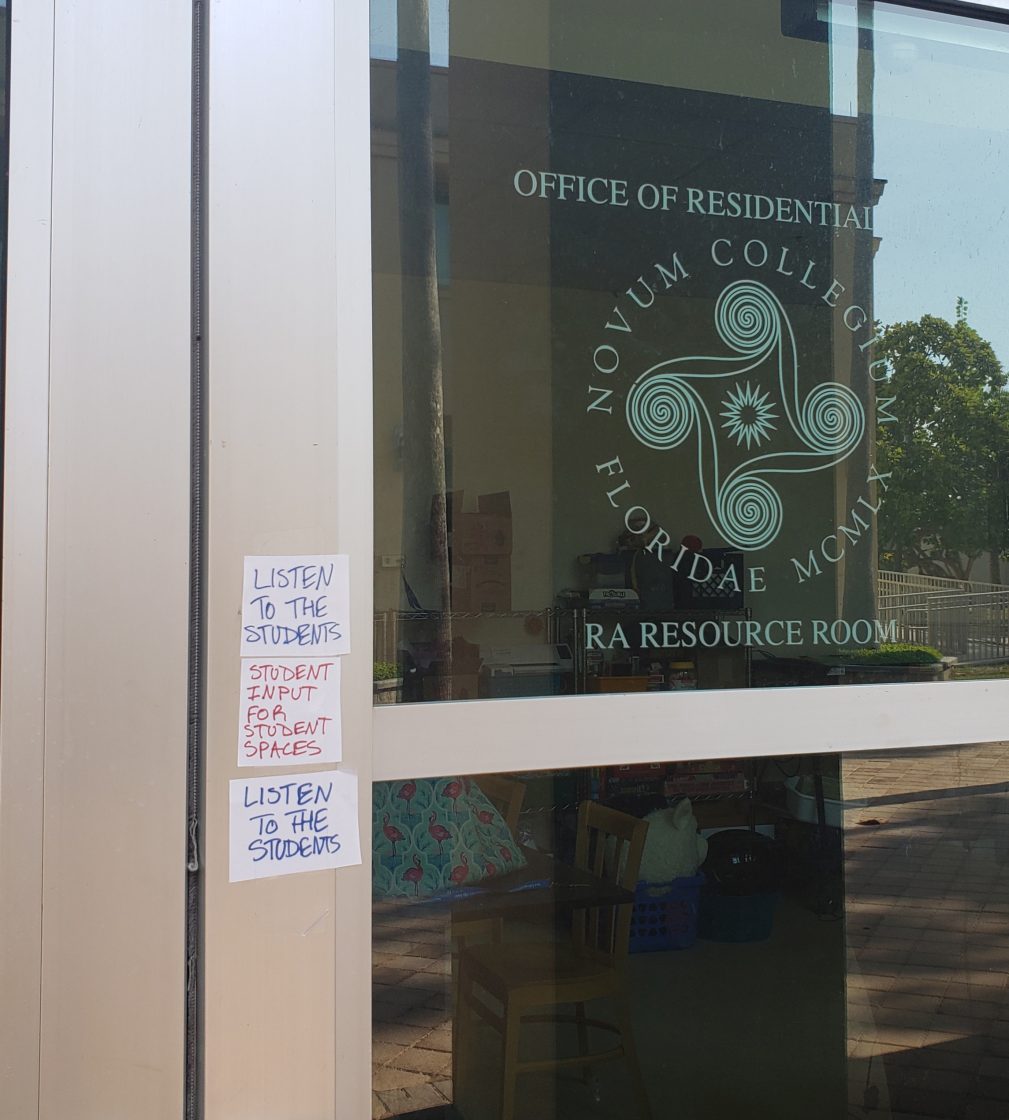
Brown first learned of plans to relocate the Catalyst office to Pei’s first court on Apr. 11 after being asked to attend a meeting by Director of Student Affairs Danielle “Dani” McCalla. Brown listed several complications that this relocation would present during this meeting and again when meeting with Thomas on May 10, including the mold and water damage documented in Pei and the building’s notoriety for having poor Internet service, especially considering the archival materials and expensive computer equipment located in the current Catalyst office.
Additionally, Catalyst faculty sponsor, Professor of Anthropology Maria Vesperi was not initially contacted about these plans. At the time of this article’s publication, and despite Brown’s insistence to Thomas, Thomas has not contacted Vesperi via email or otherwise.
The fact that members of the Catalyst were informed about Thomas’ plans to relocate the Catalyst office as early as Apr. 11 begs the question as to why RAs were not informed until May 4, especially if these two relocations are linked and especially if Thomas claims to have gained approval from Lombardi for these plans last fall.
“She started dreaming this up in October and November, which makes no sense because she said today [as of May 12] that she still doesn’t know our community, so how could you have known it six, seven months ago?” Lombardi asked.
A point that Thomas has reemphasized while receiving criticism from students is that she is still a new staff member and does not know “how things work” at New College. Thomas has been a staff member since Aug. 15, 2021.
“I don’t know why it took so long, but it feels like this timing of the subcontractors that were announced to Grace was really intentional,” Lombardi continued. “It doesn’t make any sense to sign subcontractors before the last week of school, the week before commencement. It feels really intentional so that she could drown out student input and have a quiet summer.”
However, the lack of student input in the Summer Refresh plan was made all the more questionable when Keenan confirmed that select school employees had been made aware of the proposed residential changes before students. During the May 10 meeting, Title IX and American Disability Act (ADA) Coordinator Taylor Parker and Counseling and Wellness Center (CWC) Director Dr. Anne Fisher were also present along with Keenan, Rezola, Kornblum and Brown. During this meeting, Thomas said that Parker and Fisher had been made aware of the proposed plan a week in advance.
“It’s ridiculous that administrators got to see those plans that she showed us in that meeting a week before,” Keenan said in an interview after the May 10 meeting. “I don’t know when they were made, maybe they were made a week before our meeting. But administrators got to see that plan, it was written down.”
Additionally, at the end of this meeting, Thomas did not initially want Keenan keeping copies of the Summer Refresh infographics that were provided to her and later displayed at the Emergency Senate Meeting, only relenting when Keenan instead asked if she could take a picture of them. Thomas explained that this was because the infographics were not updated.
“If it’s not finalized, when are you going to finalize it?” Keenan asked. “It [was] the day before classes ended. It was very clear that she had zero plans of getting student input and had made zero attempts to actually get student input effectively. To know that even if we were given those pamphlets two weeks ago, I could have gotten student input, kind of. I wouldn’t have been happy about it, but something. So much of this was hidden and not communicated to the students, and when it was, it was incredibly unclear communication.”
Keenan also said, “She knows to consult people about their offices being moved to make sure that they’re okay with it, but for some reason, she doesn’t respect students enough to give them that same courtesy.”
Student Testimonies and Accusations
Lombardi provided personal testimony during the Emergency Senate Meeting, which contained accusations of verbal and administrative “abuse” from Thomas during her term as NCSA President.
“I’ve refrained from sharing the details about this for a long time because they’re very deeply personal and emotional, but at this point, I’m out of my role and I feel like something needs to be done,” Lombardi said at the beginning of her testimony.
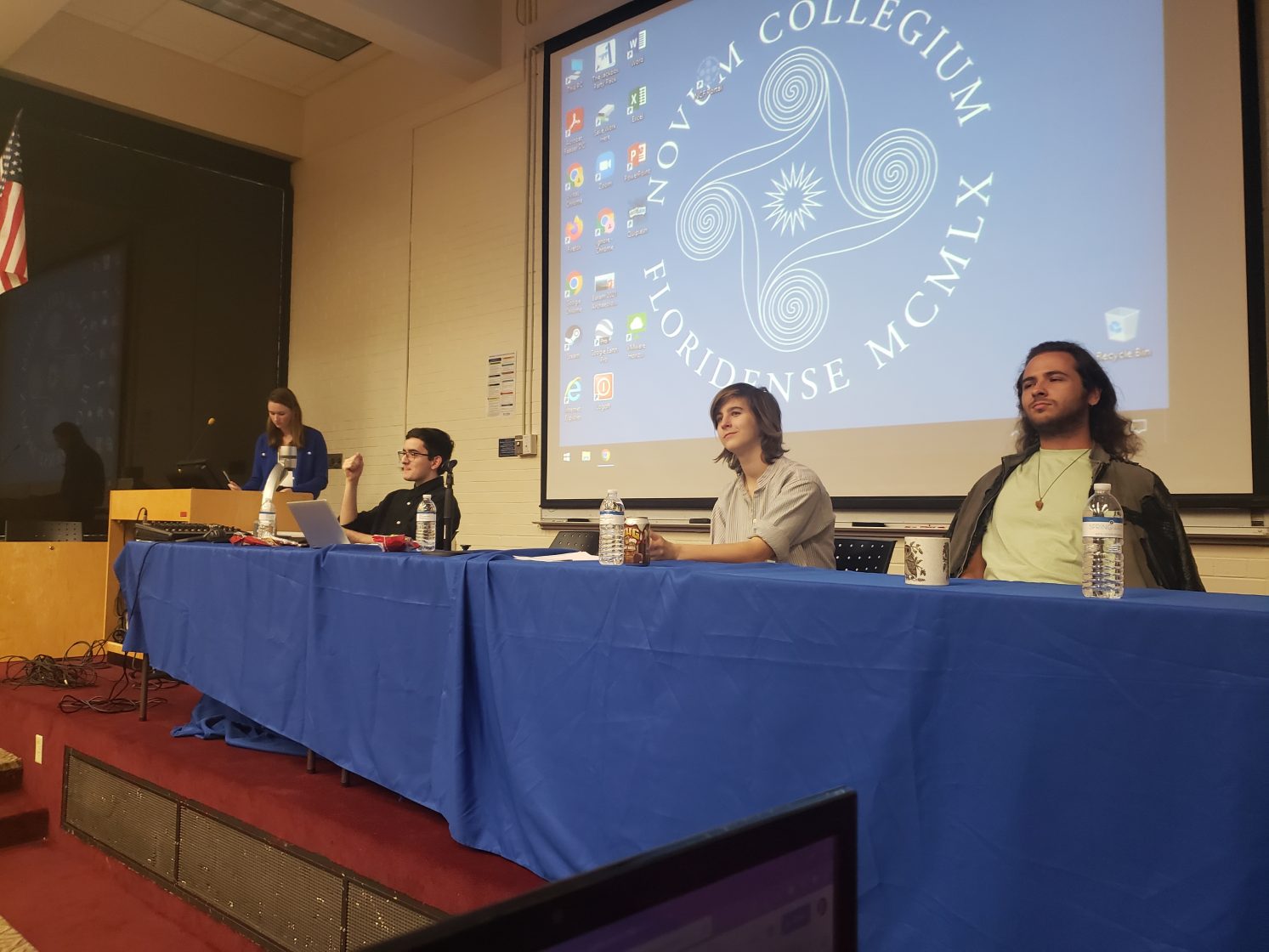
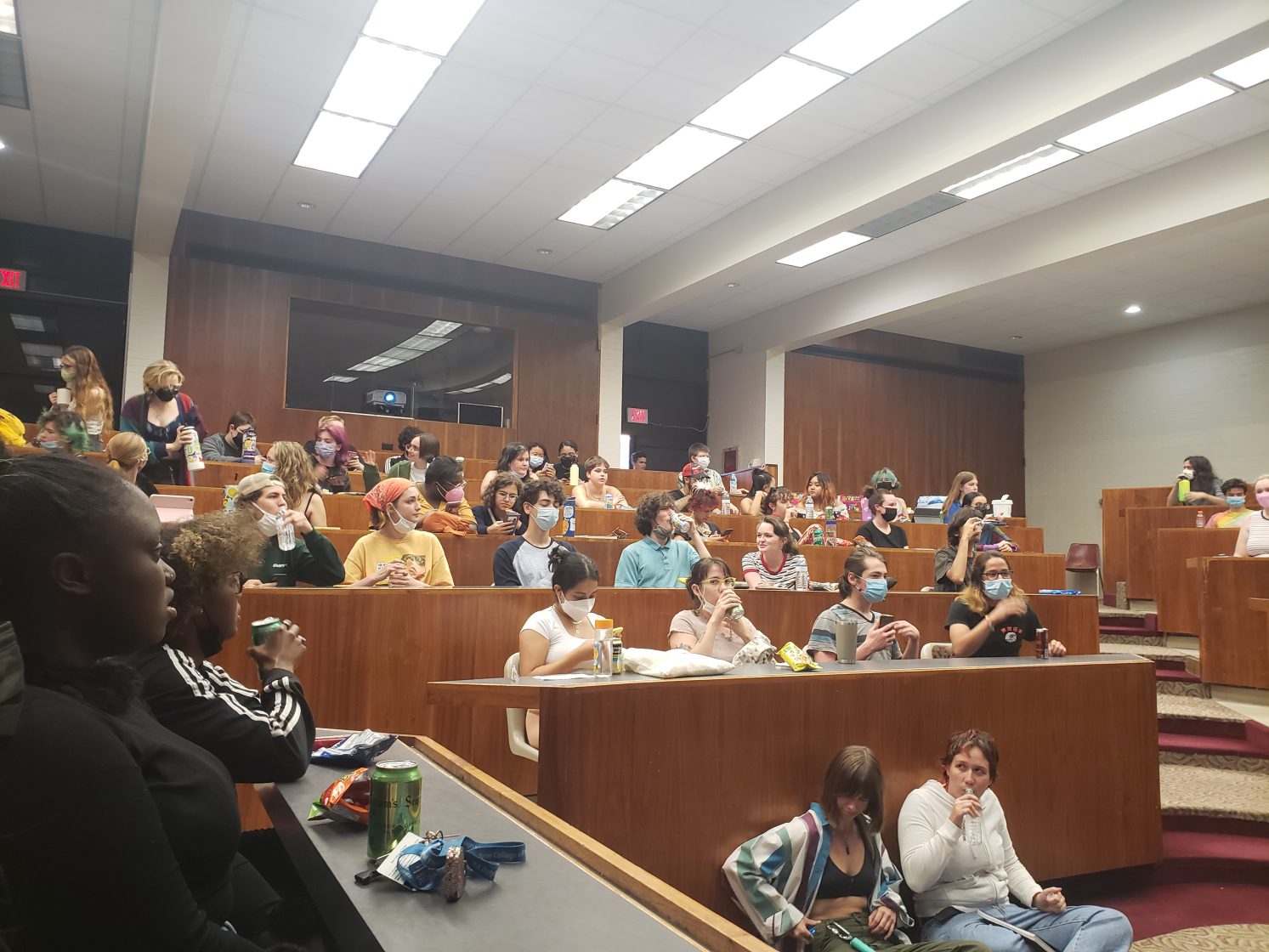
Lombardi then listed several accusations, including Thomas using her personal phone number to call her outside of work hours and late into the night to berate her, taking credit for Lombardi’s ideas and lying to President Patricia Okker about receiving Lombardi’s approval for initiatives she either did not know about or did not approve.
“I cannot begin to explain how difficult it is for me to be here right now, how difficult it was for me to remain a student leader and be NCSA President during the last year,” Lombardi said. “I had planned to resign at least five or six times because I could not handle it.
“It took me a really long time to come to terms with what she was doing to me because she made me feel really isolated, really inadequate,” Lombardi continued later in her testimony. “She made me feel like I was doing something wrong.”
Lombardi also stated during the Emergency Senate Meeting that Student Affairs staff have privately described similar experiences with Thomas.
“I wanted to share this with you today, not to ask for your sympathy, but to ask for your action,” Lombardi concluded. “I feel really sick at the thought of one more student experiencing even a fraction of the abuse I have gone through.”
Keenan also offered testimony and recounted her experiences with Thomas. She described Thomas taking advantage of her recent transition into the role of NCSA President in this process, and claims that up until a month ago, Thomas did not know her name despite having been NCSA Chief of Staff and later Vice President for the past year.
Keenan described feeling coerced when it came to her initial decisions to approve the relocations of the ETQA office and NCSA Closet in favor of the E-Sports room and the Mac Lab. Keenan said that her first meeting with Thomas as NCSA President was when she gave her approval to make these relocations, but that much about them was unclear at the time.
“The thing is, Marjorie was giving us artificial constraints,” Keenan said. “It was very unclear why the Mac Lab had to move, from my memory. It was not, ‘Yes, the Mac Lab should be in the NCSA Closet, that’s the best place for it.’ It was never that. We felt like we had to say yes just to get her to stop.”
“I did not want to say no to the E-Sports room going into there because I know the E-Sports team really wants a space,” Keenan elaborated. “I think the E-Sports room is a great idea. But given the fact that we have been told all of these artificial constraints, that we have been told there are no other options and all of this stuff, I just don’t believe that that is the only option for the E-Sports room. And given that logic, it might not be the best place for the E-Sports room. I want to make sure that before we spend all this money moving all of these things, that it’s the right decision.”
Students in the audience during the Emergency Senate Meeting also came forward with accusations against Thomas. Third-year Rocío Ramírez Castro—who is also Lombardi’s roommate—backed up Lombardi’s claim that Thomas would call her at non-working hours to berate her and claimed to have been present for several of these phone calls. Multiple students stated that they did not know who Thomas was and that they had never seen her on campus before—while in comparison, former Interim Dean of Student Affairs Randy Harrell and Interim Assistant Dean of Students Nicole Gelfert were and are well-known by students on campus.
“Every time I point out these various things, the biggest excuse she has given for her behavior is that she is new here and doesn’t yet understand our school or our culture,” Keenan said during the Emergency Senate Meeting. “She has had a full year here. This is not acceptable at any school.”
Furthermore, first-year Emma Halbisen and student representative for the New College Challenge explained during the Emergency Senate Meeting that despite working closely with Thomas, she had never been informed about the Summer Refresh. Co-Chair of Green Affairs and third-year London Weier also described putting together a beautification proposal for residential campus alongside Co-Chair and third-year Zane Cullinane Walsh that involved working with Housing and the Physical Plant, but that when they brought the proposal to Thomas, she never responded.
Perhaps the most shocking revelation during the Emergency Senate Meeting was the announcement of two articles covering Thomas’ controversial actions as Dean of Students at her previous institution, William & Mary (W&M). Few records of Thomas emerge when conducting a simple Google search, but one article reveals that in 2018, Thomas “grossly mishandled” a federal Title IX investigation.
“Thomas wrote in the letter that although Christine [a pseudonym for the victim] was incapacitated at the time of the sexual contact, witnesses who saw her beforehand said she was speaking clearly, walking without difficulty and had enough motor coordination to play a drinking game,” Norfolk News & Weather website, WAVY.com wrote. “The student accused of assaulting Christine couldn’t have known she was blackout drunk, and therefore, couldn’t be found responsible of wrongdoing, Thomas concluded.”
The second article documents a letter Thomas wrote in 2020 regarding a COVID-19 Zero Tolerance Policy, which included “party patrols” and threats to those who attended large gatherings with suspension.
“Do not be the person who causes us to shut down this semester,” Thomas wrote, according to an article by Williamsburg Yorktown Daily. “Do not be the reason that valued W&M employees are furloughed or lose their jobs. Do not test the resolve of this university to take swift action to prioritize the health and well-being of our campus and the Williamsburg community.”
With these articles in mind, Lombardi suggests that Thomas’ Summer Refresh is a means of exercising power over students.
“When you see how ridiculous some of these changes are and how fast they were made, and how they were made without input, it feels like this is her way to demonstrate that she has control over us,” Lombardi said. “W&M is obviously a very different institution than New College. I don’t think she realized how much students [have] agency here and how driven students are in terms of activism, social justice, mobilization and organizing. But I absolutely believe that this was a mechanism of control.”
The May 12 Protest
Towards the end of the Emergency Senate Meeting, several students suggested that an impromptu protest take place the following day on May 12 outside of Thomas’ office at HCL 2. This was once a conference room that anyone could rent out, and which was used by the SSC in the past, but Thomas has since claimed it as her office.
Students arrived at 8:30 a.m. with handmade signs and stickers with slogans such as “We Are Holding You Accountable” and “Listening to Students is Your Job.”
“My sign says, ‘Why Were You Hiding This From Us?’” thesis student X González said at the start of the protest. “Specifically regarding the changes to public student campus spaces, and how she’s meeting with contractors before anybody has had the opportunity to approve or deny these changes. All of the students here today are showing this disapproval. You didn’t consult us, it’s not fair.”
At approximately 8:45 a.m., Thomas emerged from her office to speak with protestors. She stayed close to the office door and briefly traded questions with students. When a student from the crowd asked if Thomas had met with subcontractors, Thomas denied this and said that a different administrator oversees contracting.
When asked if she had consulted any students at any point during this process and if she could name any of them, Thomas said that she had been speaking with Lombardi since November. Additionally, Thomas stated that it was “not her inclination” to inform RAs ahead of time about the relocation of the RA Resource Room, and that she has “literally only been here nine months.” When a student from the crowd yelled back that this was students’ living and working space, Thomas replied, “I’m sorry, I didn’t know.”
Students countered that nine months is a long time at such a small school, to which Thomas responded, “There’s been a lot going on, I’m sorry that you feel that way.” The crowd quickly grew heated and began chanting, and Thomas reentered her office after about 15 minutes of speaking with students.
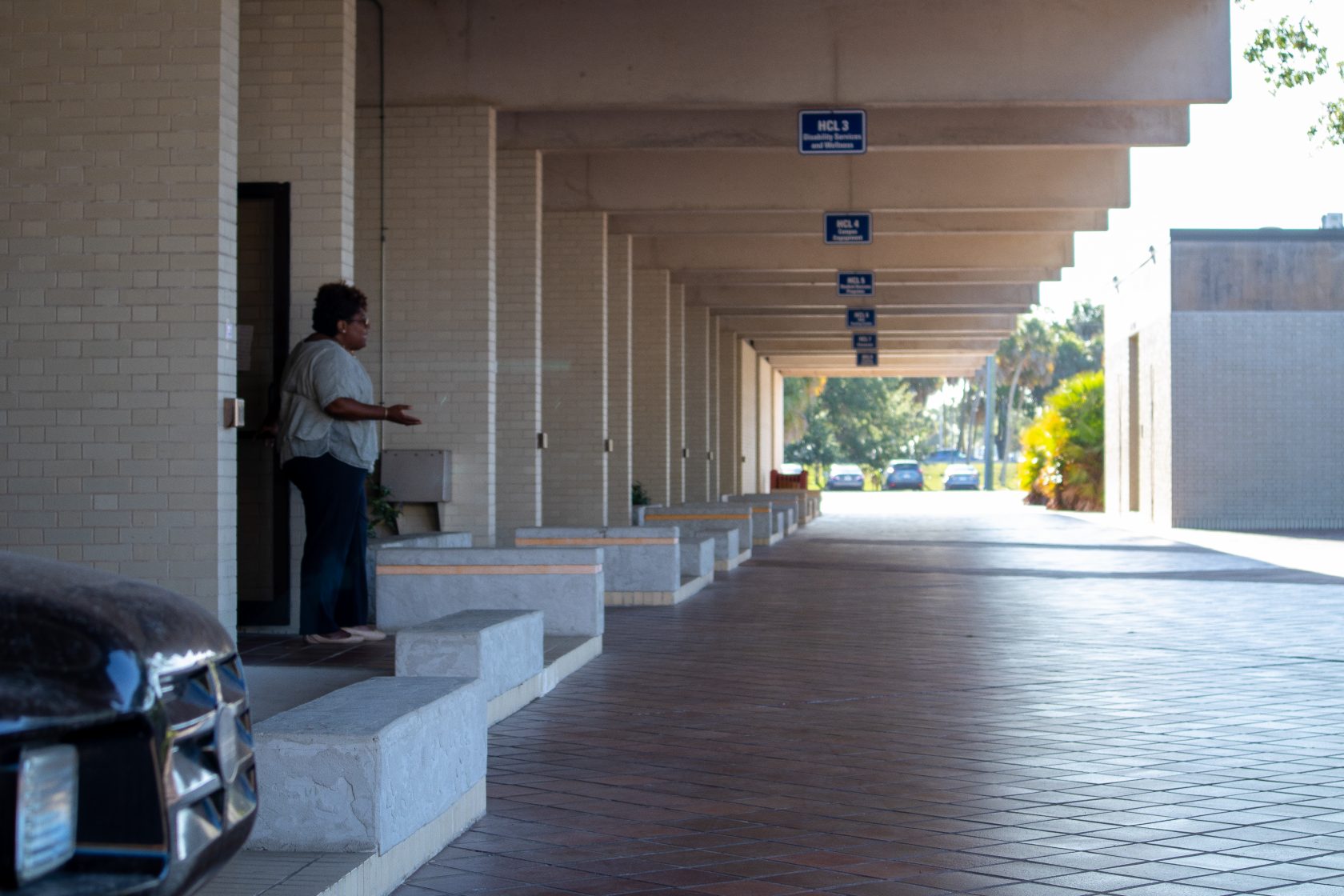
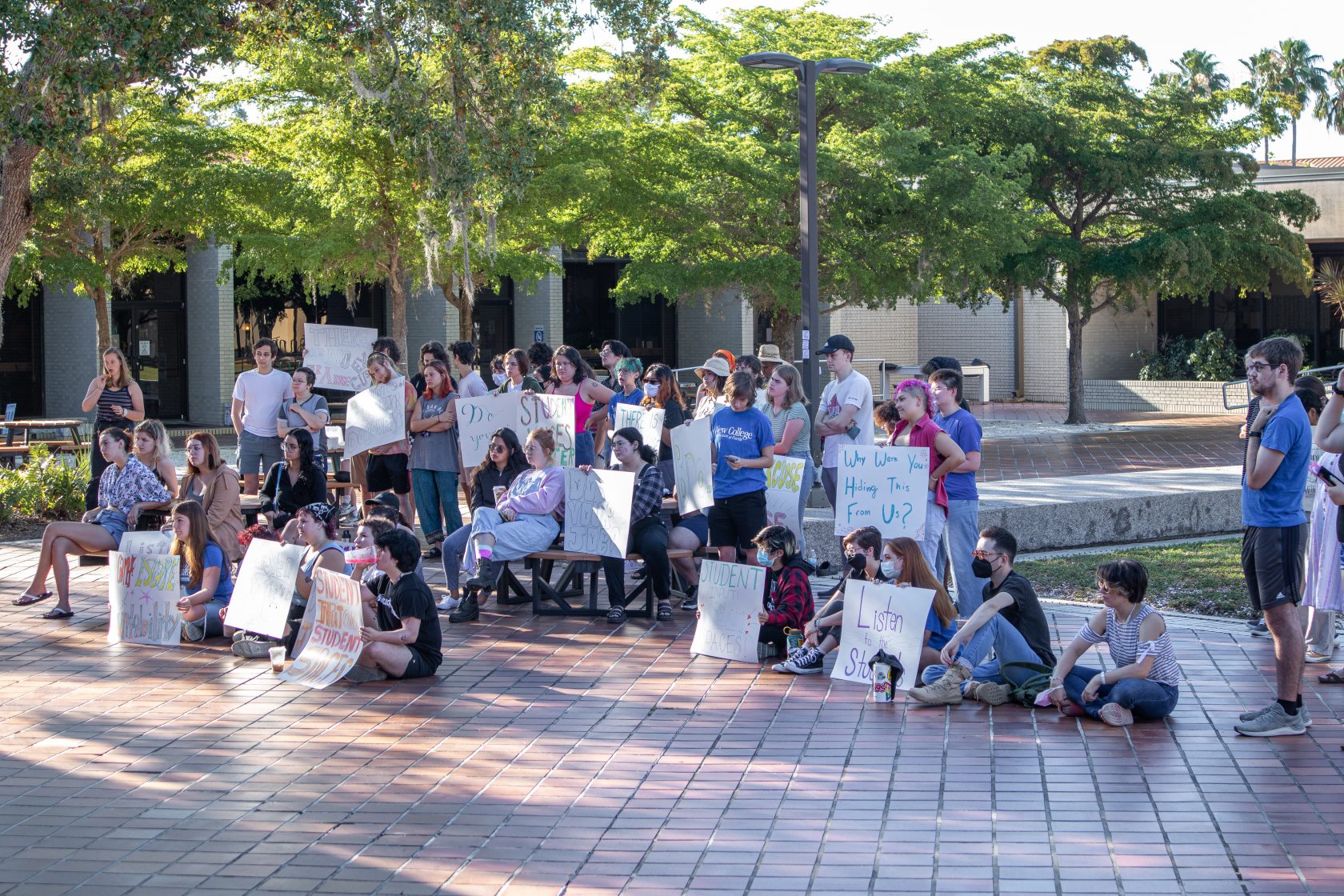
However, approximately 20 minutes after Thomas left, President Patricia Okker arrived at the protest and pulled up a chair to better speak with students. She explained that, despite the seemingly rushed nature of the Summer Refresh, and although renovations and physical changes are often delegated to administrators other than herself, it was not too late to reevaluate and that she had come to the protest in order to better hear students out.
“We may disagree with some things, but I will always listen,” Okker told the assembly.
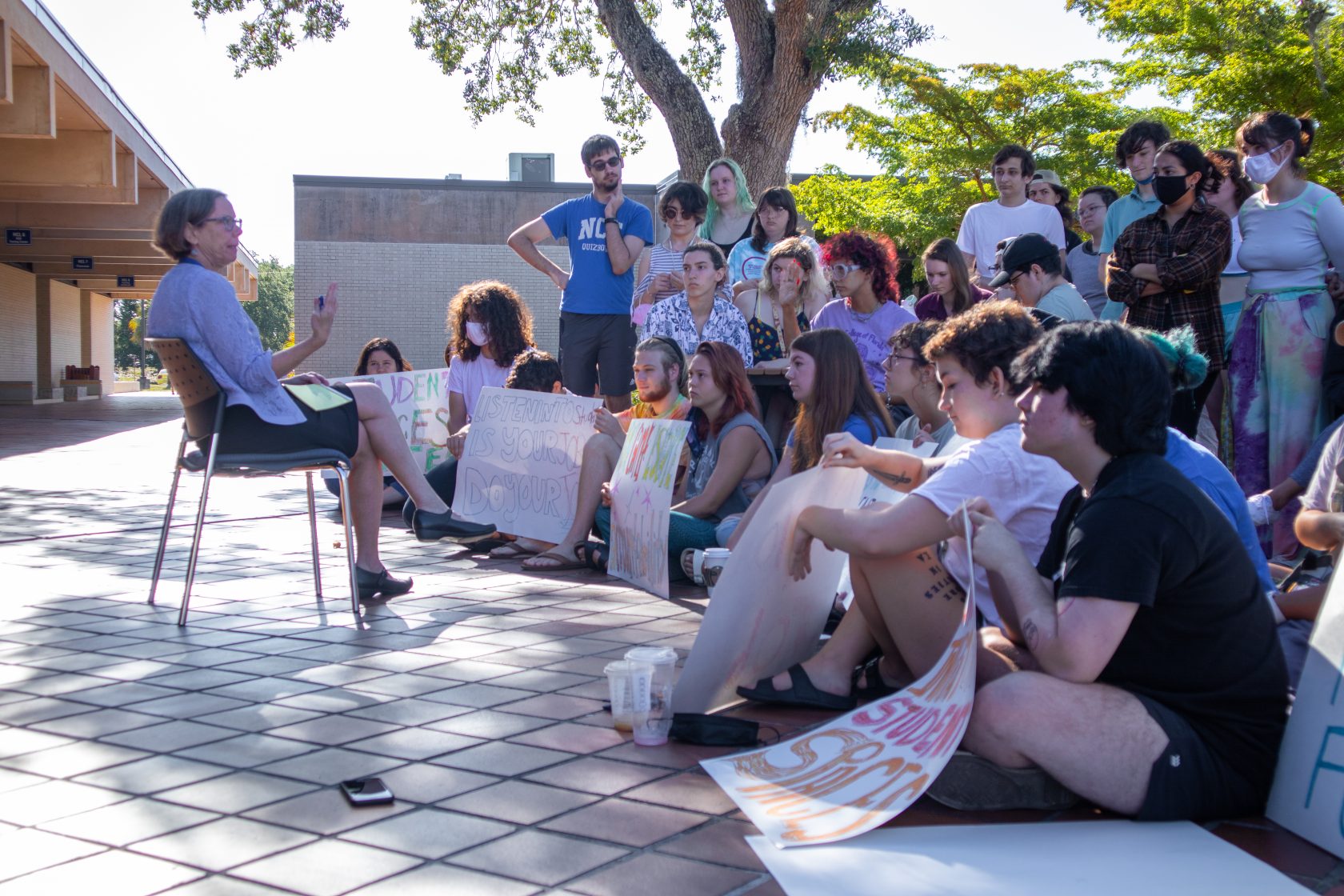
Okker explained that she had been previously made aware of the allegations against Thomas, but that a personnel decision of this magnitude could not be decided on in one morning, and that it would be inappropriate to make any decisions at this time without further channels being explored. Instead, Okker suggested that students tell her about their goals for tackling the Summer Refresh and their grievances with Thomas, and also posed the question as to whether mediation instead of Thomas’ removal was possible.
“I do believe that when relationships get damaged, sometimes they’re beyond repair,” Okker explained. “And sometimes they can be repaired, and I will always be looking for [whether] we can move forward.”
Students voiced several opinions during this time, including that they are “campus stakeholders” who should be consulted on renovations and relocations to residential spaces and that—referencing both Lombardi’s allegations and the articles about Thomas’ employment at W&M—it would not be appropriate to keep her on staff. One student stated that when thinking about retention, administrators often conclude that there is “not enough to do on campus”—but that the root of the problem from the student’s perspective was actually the “quality of life on campus,” and that administrators who perpetuate behavior such as Thomas’ hurt the retention and mental health of students.
Approximately 32 minutes into the conversation, Thomas reemerged from her office, appearing to be on a phone call. She quietly left the scene, but not without students taking notice.
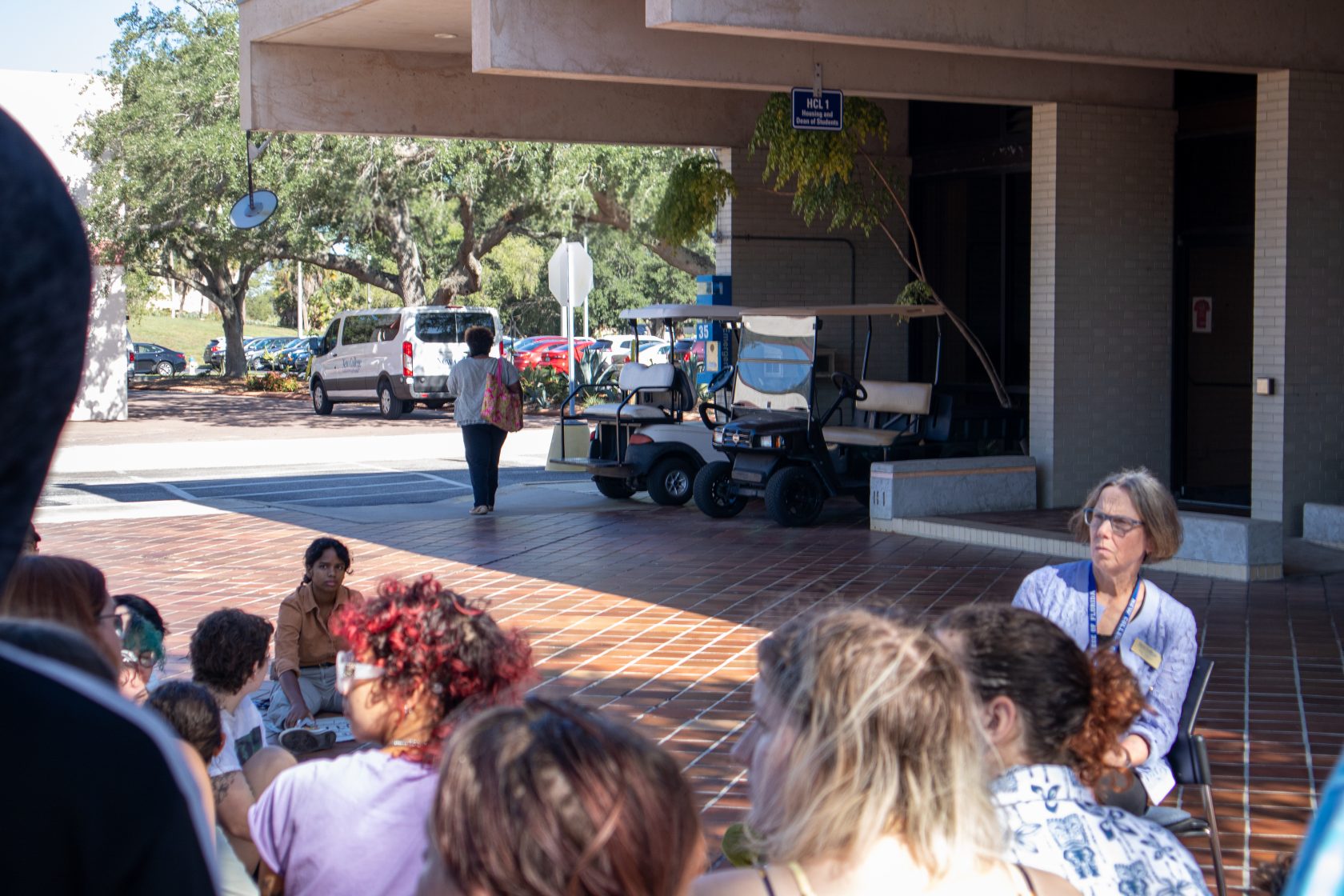
“As a group, I fully concede that—you’re telling me loud and clear that the goals [of the Summer Refresh] don’t make sense,” Okker said. “I’m hearing you. What I am asking is for you to recognize that I also am going to listen to the specifics of people who have worked on these [plans] and what their ideas are.”
After approximately two hours of conversation, Okker said that she was going to get lunch in Ham, and that students were welcome to join her and continue the conversation, at which point the protest formally ended. Afterwards, students hung up the posters they made outside of Ham.
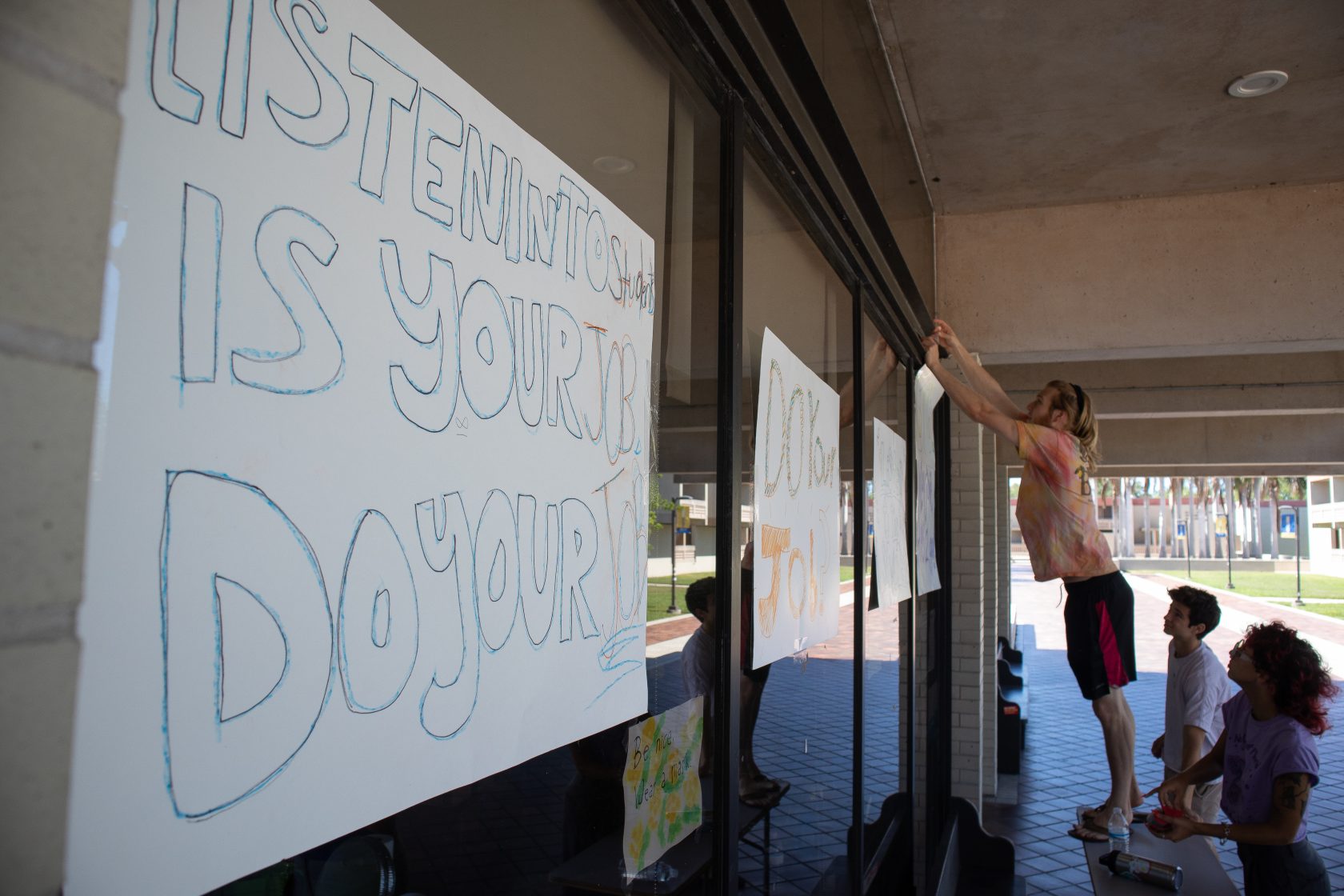
These posters were removed by a facilities employee who was directed to do so the following morning, according to Keenan.
“Since there was no profanity, I cannot imagine that the posters violated any guidelines and it was unclear why they were being taken down now,” Keenan wrote in an email announcement sent to students on May 13. “I cannot find any guidelines about this issue posted publicly. I was told that someone will be sending out the poster guidelines soon, but I will continue to search for them in the meantime.”
Since then, several of these posters have been hung back up in front of Ham—this time from inside the windows of the NCSA Office.
“Dealing with conflict within our community is never easy, and our recent protest was difficult for all involved,” Okker wrote in a statement she provided to the Catalyst on May 17. “Last week I had the opportunity to have an extended conversation with the students who were protesting to listen and to learn about their perspectives. Moving forward I am focused on continuing dialogue with those involved and finding a fair resolution.”
Going Forward
Shortly after the unanimous vote of 111 was passed on May 11, two amendments were also proposed and unanimously voted on: to draft a written proposal to the New College community explaining the rationale behind this vote, and to include a list of demands going forward, which would be shown to the student body to gather feedback before being released publicly. A third proposal, which won the majority vote, suggested that the statement be drafted by one NCSA representative, one RA representative and one Catalyst representative, as these parties were ruled the most impacted by the Summer Refresh. However, the outcome of the investigation against Thomas may affect the contents and authorship of this statement, or whether it will need to be penned at all.
To conclude the Emergency Senate Meeting, NCSA Vice President Xabier Rezola offered a closing statement, thanking students for coming out on the last day of classes and working to effect change.
“You don’t have to jump into student government, you don’t have to run for presidency—this right here is enough and this is what we need from you,” Rezola said. “New College is a student-driven school, and we need administration to know that. We can’t let them forget that and we can’t let them take our power. We have to show them how capable we are and we have to make a change.”
In the meantime, an outside investigation against Thomas has been launched, as was announced to the New College community by Okker on May 13.
“Students are the reason New College exists, and I am committed to responding to their concerns in a fair and appropriate manner,” Okker wrote in this announcement. “I am also committed to handling complaints in a way that ensures due process for those involved. Handling these conflicts is never easy, and I know that many of you are struggling at this time. I also know that our values of openness and mutual respect can guide us to a more equitable and inclusive community.”
Nickolas Steinig contributed reporting to this article.

